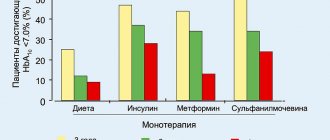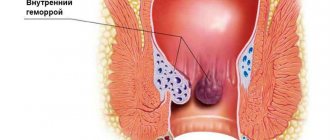Potassium iodide reneval 100 mcg 112 pcs. pills
pharmachologic effect
A product containing inorganic iodine.
When iodides enter the epithelial cells of the thyroid follicle, under the influence of the enzyme iodide peroxidase, iodine is oxidized to form elemental iodine, which is included in the tyrosine molecule. In this case, one part of the tyrosine radicals in thyroglobulin is iodinated. Iodinated tyrosine radicals condense into thyronines, the main of which are thyroxine (T4) and triiodothyronine (T3). The resulting complex of thyronine and thyroglobulin is released as a deposited form of thyroid hormone into the follicle colloid and remains in this state for several days or weeks. With iodine deficiency, this process is disrupted. Potassium iodide, compensating for iodine deficiency, helps restore impaired synthesis of thyroid hormones. With normal iodine content in the environment, under the influence of excess iodides, the biosynthesis of thyroid hormones and their release from thyroglobulin are inhibited, the sensitivity of the thyroid gland to the thyroid-stimulating hormone of the pituitary gland is reduced and its secretion by the pituitary gland is blocked.
Composition and release form Potassium iodide reneval 100 mcg 112 pcs. pills
Tablets - 1 tablet:
- Active substance: Potassium iodide - 131 mcg, which corresponds to - 100 mcg of iodine.
- Excipients: Magnesium hydroxycarbonate (basic magnesium carbonate) - 0.0175 g; Lactose monohydrate (milk sugar) - 0.059869 g; Microcrystalline cellulose - 0.02 g; Magnesium stearate - 0.001 g; Colloidal silicon dioxide (aerosil) - 0.0005 g; Croscarmellose sodium - 0.001 g.
- newborns and children: 100 mcg/day;
- adolescents and adults: 100-200 mcg/day;
- during pregnancy and breastfeeding: 150-200 mcg/day.
- 100-200 mcg/day.
14 tablets in a blister pack made of polyvinyl chloride film and aluminum foil.
4, 8 blister packs of 14 tablets each with instructions for use are placed in a cardboard pack.
Description of the dosage form
Tablets are white, round, flat-cylindrical with a bevel, with or without an “R” marking on one side.
Characteristic
Potassium iodide, being a source of iodine, replenishes its deficiency in the body, prevents the development of iodine deficiency diseases, and prevents the development of goiter associated with a lack of iodine in food; normalizes the size of the thyroid gland in newborns, children, adolescents and adults.
Directions for use and doses
The daily dose of the drug should be taken orally in one dose, after meals, with plenty of liquid.
When using the drug in newborns and children under 3 years of age, it is recommended to dissolve the tablet in a small amount (1 tablespoon) of boiled water at room temperature.
- Recommended doses (in terms of iodine):
Prevention of the development of endemic goiter:
Prevention of goiter recurrence after completing a course of goiter treatment with thyroid hormones or after its surgical removal:
Treatment of euthyroid goiter:
- newborns, children and adolescents: 100-200 mcg/day;
- young adult patients: 300-500 mcg/day.
The drug is taken for prophylactic purposes for, as a rule, several months or years, or, if indicated, for life.
Treatment of goiter in newborns is carried out in most cases within 2-4 weeks; in children, adolescents and adults it usually takes 6-12 months, long-term use is possible.
The duration of treatment is determined by the doctor.
special instructions
Before starting treatment, it is necessary to exclude malignant lesions of the thyroid gland, hyperthyroidism or nodular toxic goiter.
During drug therapy in patients with impaired renal function, hyperkalemia may develop (periodic monitoring of potassium concentration in the blood is necessary).
Due to the presence of lactose monohydrate in the drug, patients with rare hereditary diseases associated with galactose intolerance, lactase deficiency or glucose-galactose malabsorption should not take the drug.
Pharmacodynamics
Iodine is a vital trace element necessary for the normal functioning of the thyroid gland. When iodides enter the epithelial cells of the thyroid follicle, iodine ions under the influence of the enzyme iodide peroxidase are oxidized to form elemental iodine, which is included in the tyrosine molecule. In this case, one part of the tyrosine radicals in thyroglobulin is iodinated, resulting in the formation of thyronines, the main of which are thyroxine (T4) and triiodothyronine (T3). Thyronines form a complex with the protein thyroglobulin, which is deposited in the colloid of the thyroid follicle. Iodine entering the body in physiological quantities prevents the development of endemic goiter (associated with a lack of iodine in food); normalizes the size of the thyroid gland in newborns, children and adolescents; and also affects the T3/T4 ratio, the concentration of thyroid-stimulating hormone.
Pharmacokinetics
When taken orally, it is quickly and completely absorbed in the small intestine and distributed in the intracellular space within 2 hours.
It accumulates mainly in the thyroid gland (iodide concentration more than 0.5 mg/g tissue), as well as in the salivary and mammary glands, and the gastric mucosa. Penetrates well through the placenta.
It is excreted mainly by the kidneys (trace amounts are determined in the urine 10 minutes after administration, 80% of the dose is excreted within 48 hours, the rest within 10-20 days), partially with the secretions of the salivary, bronchial, sweat and other glands.
Indications for use Potassium iodide reneval 100 mcg 112 pcs. pills
- prevention of the development of endemic goiter, including during pregnancy;
- prevention of goiter recurrence after completion of a course of goiter treatment with thyroid hormone preparations or after its surgical removal;
- treatment of diffuse euthyroid goiter in newborns, children, adolescents and young adult patients.
Contraindications
- hypersensitivity to iodine;
- severe thyrotoxicosis;
- latent thyrotoxicosis (when using doses exceeding 150 mcg/day);
- dermatitis herpetiformis;
- toxic adenoma, nodular goiter when used in doses of more than 300 mcg/day (with the exception of preoperative therapy to block the thyroid gland);
- hereditary diseases associated with galactose intolerance, lactase deficiency or glucose-galactose malabsorption.
Potassium iodide should not be taken for hypothyroidism, unless the development of the latter is caused by severe iodine deficiency. The use of the drug should be avoided during therapy with radioactive iodine, the presence or suspicion of thyroid cancer.
Carefully:
In patients with impaired renal function.
Effect on the body
Potassium iodide, being a source of iodine, replenishes its deficiency in the body, prevents the development of iodine deficiency diseases, and prevents the development of goiter associated with a lack of iodine in food; normalizes the size of the thyroid gland in newborns, children, adolescents and adults.
Application of Potassium iodide reneval 100 mcg 112 pcs. pills during pregnancy and breastfeeding
During pregnancy and breastfeeding, the need for iodine increases. Potassium iodide is prescribed according to indications in cases where the intake of iodine from food is less than 150-300 mcg/day. The drug penetrates the placenta well and can cause the development of hypothyroidism and goiter in the fetus. Iodine is also excreted in breast milk.
Therefore, during pregnancy and breastfeeding, the drug should be used only in recommended doses.
special instructions
It should be taken into account that during drug therapy in patients with renal failure, hyperkalemia may develop.
Before starting therapy, it is necessary to exclude the presence of hyperthyroidism or nodular toxic goiter in the patient, as well as a history of these diseases.
If there is a predisposition to autoimmune thyroid diseases, the formation of antibodies to thyroid peroxidase is possible.
Saturation of the thyroid gland with iodine can prevent the accumulation of radioactive iodine used for therapeutic or diagnostic purposes. In this regard, it is not recommended to take the drug before carrying out activities using radioactive iodine.
Overdose
When using the drug in a dose exceeding 150 mcg/day, latent hyperthyroidism can become manifest.
With long-term use of the drug at a dose exceeding 300 mcg/day, the development of iodine-induced hyperthyroidism is possible (especially in elderly patients, in the presence of nodular goiter or toxic adenoma).
Symptoms of acute overdose: brown discoloration of mucous membranes, reflex vomiting, abdominal pain and diarrhea (possibly melena). In severe cases, dehydration and shock may develop.
Treatment for acute overdose: gastric lavage, administration of sodium thiosulfate, symptomatic treatment of water-electrolyte imbalance, anti-shock therapy.
Chronic overdose can lead to the development of the phenomenon of “iodism”: “metallic” taste in the mouth, swelling and inflammation of the mucous membranes (rhinitis, conjunctivitis, gastroenteritis, bronchitis), acne, dermatitis, swelling of the salivary glands, fever, irritability.
Treatment for chronic overdose: drug withdrawal.
Side effects Potassium iodide reneval 100 mcg 112 pcs. pills
When using the drug according to indications in recommended doses, the occurrence of side effects is unlikely.
Allergic reactions may occur: rarely - skin rash, Quincke's edema.
Drug interactions
Simultaneous use of antithyroid drugs weakens the effect of potassium iodide (mutually).
Potassium perchlorate and thiocyanate inhibit iodine uptake by the thyroid gland.
Thyroid-stimulating hormone improves the absorption of iodine by the thyroid gland and stimulates the production of its hormones.
Concomitant use of angiotensin-converting enzyme inhibitors (including captopril, enalapril, lisinopril) increases the risk of hyperkalemia.
High doses of iodine in combination with potassium-sparing diuretics can lead to hyperkalemia.
Simultaneous therapy with iodine in high doses and lithium preparations promotes the development of goiter and hypothyroidism.
Potassium iodide reduces the uptake of 131I and 123I by the thyroid gland.
Indapamide Renewal, tablets coated. captivity. about. 2.5 mg, 30 pcs.
If liver function is impaired, thiazide and thiazide-like diuretics can lead to the development of hepatic encephalopathy. In this case, the use of diuretics must be stopped immediately.
Cases of photosensitivity reactions have been reported when taking thiazide and thiazide-like diuretics. If photosensitivity reactions develop during therapy, you should immediately stop taking indapamide. If it is necessary to continue diuretic therapy, it is recommended to protect the skin from exposure to sunlight or artificial ultraviolet rays.
The concentration of sodium ions in the blood plasma must be determined before starting treatment and then regularly monitor this indicator. Hyponatremia and hypovolemia can lead to dehydration and orthostatic hypotension. A concomitant decrease in the concentration of chloride ions can lead to secondary metabolic alkalosis. For patients with liver cirrhosis and elderly patients, more frequent monitoring of the concentration of sodium ions in the blood plasma is indicated.
Long-term use of thiazide and thiazide-like diuretics poses a risk of decreasing plasma potassium concentrations and developing hypokalemia. It is necessary to prevent the risk of developing hypokalemia (< 3.4 mmol/l), especially in elderly patients, debilitated or receiving concomitant drug therapy, in patients with liver cirrhosis accompanied by edema and ascites, in patients with coronary vascular diseases and with heart failure, since hypokalemia entails the likelihood of arrhythmia (hypokalemia in patients of these groups enhances the toxic effect of cardiac glycosides). The risk of hypokalemia is also possible in patients with a prolonged QT interval. Hypokalemia predisposes to the occurrence of severe arrhythmias, especially the deadly polymorphic ventricular tachycardia of the “pirouette” type. It is necessary to regularly monitor the potassium content in the blood plasma in all of the above cases.
Thiazide and thiazide-like diuretics may reduce the excretion of calcium ions by the kidneys, which may lead to a moderate and temporary increase in plasma calcium concentrations.
It is necessary to regularly monitor the concentration of glucose in the blood plasma in patients with diabetes mellitus, especially in the presence of hypokalemia.
If the concentration of uric acid is elevated, attacks of gout may occur; in such cases, it is necessary to adjust the dose of indapamide accordingly.
Hypovolemia caused by loss of fluid and sodium ions, when treated with diuretics, can cause a decrease in glomerular filtration, which may result in an increase in the concentrations of urea and creatinine in the blood plasma.
Impact on the ability to drive vehicles and machinery
During the treatment period, patients who experience dizziness, fatigue, headache, or decreased blood pressure should refrain from driving vehicles and other activities that require high concentration and speed of psychomotor reactions.

